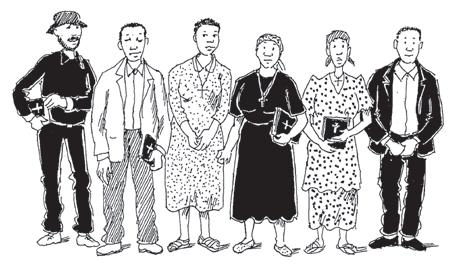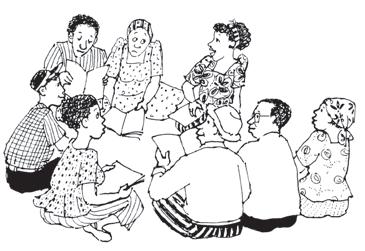Confidentiality is very important, especially when working with survivors of sexual violence. You must make sure that any personal information is not shared with others outside of the discussion, unless the person gives you permission to do so. Tell your group at the start of the meeting that, in order to keep a safe space, all the information shared during the discussions must not be shared with people outside the group. NOTE: There are circumstances in which you may
need to tell a third party about the information you have heard. This is in case someone is in grave danger and the police need to be involved, particularly when this involves a child. See more on pages 46–47.
‘You must be the change you want to see in the world.’ Mahatma Gandhi
The facilitator’s own awareness and understanding of sexual violence There are key things that each facilitator needs to be aware of when leading discussions on sexual violence: A. HIS/HER OWN ATTITUDE TO SEXUAL VIOLENCE This means the facilitator should be aware of his/her own beliefs and should disclose any myths he/she may have believed, as well as understanding how culture and beliefs have shaped his/her understanding of sexual violence. This is the first and the most important step: being open about one’s own misconceptions and misunderstandings is vital to facilitating impartial discussions and to ensure survivors of sexual violence feel included within these discussions. It also allows the facilitator to experience personal growth and learning. The self-discovery tool (on pages 50–51) is a tool that enables the facilitator to reflect on and understand his/her personal attitudes and behaviour around issues of sexual violence. It is important to understand that we all have different views of and attitudes to sexual violence. The facilitator may learn from members of the community and be challenged as he/she listens to individuals’ experiences. B. GROUP DISCUSSIONS MAY INVOLVE SURVIVORS OF SEXUAL VIOLENCE The facilitator needs to be sensitive in facilitating discussions about sexual violence as some participants may have had painful experiences and may not have received support and treatment to enable healing. It is important to have a trained counsellor at hand or be able to refer survivors to expert care and support. C. RECENT INCIDENTS OF SEXUAL VIOLENCE IN THE MEDIA These events may have been reported in the newspapers, or talked about in the community or on the radio. The way these events have been reported will also affect an individual’s thoughts and beliefs about sexual violence.
© TEARFUND 2021
10






